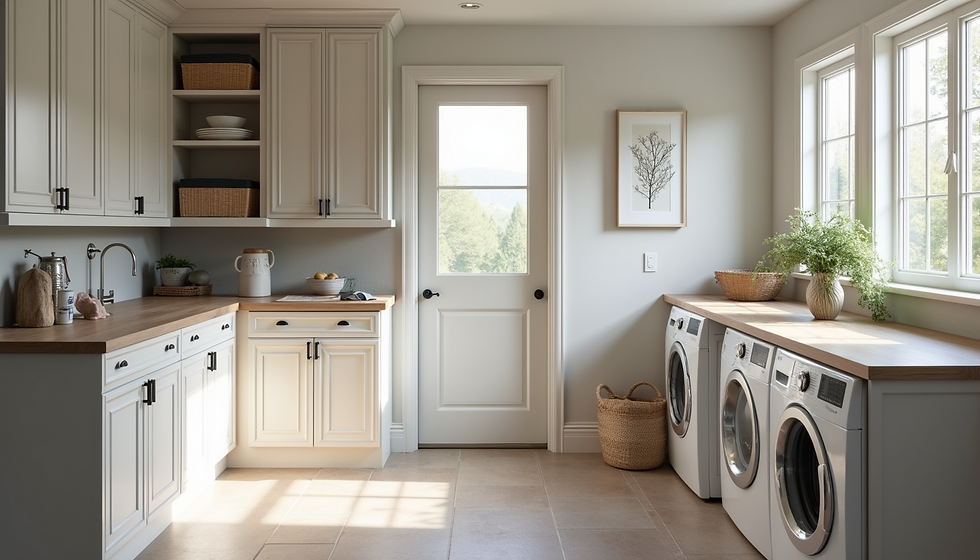Understanding Kitchen Remodel Costs: Key Factors and Budgeting Strategies for Homeowners
- The Home Tuner
- May 13, 2025
- 4 min read
Updated: Jul 25, 2025
Remodeling your kitchen can breathe new life into your home, making it more functional and aesthetically pleasing. However, it's essential to consider the various costs involved in a kitchen remodel before diving head-first into renovations. This guide will help you to understand kitchen remodel costs, explore key factors that influence these expenses, and provide budgeting strategies to ensure your project stays financially on track.
Factors Influencing Kitchen Remodel Costs
Before you can effectively budget for your kitchen remodel, it's vital to understand what influences kitchen remodel costs. Here are several key factors that can impact your overall expenses:
1. Kitchen Size
The size of your kitchen is perhaps the most straightforward factor affecting your remodel costs. A larger kitchen typically requires more materials, labor, and time, all of which can drive up costs.
Smaller kitchens might be less expensive to remodel, but only if the scope of work remains limited. It's crucial to assess whether your new design will expand the footprint of your kitchen or if you'll keep the current layout, as this decision significantly impacts your budget.
2. Layout Changes
Changing the layout of your kitchen can add considerable costs to your remodel. If you decide to move plumbing or electrical components, you can expect to incur additional expenses.
In most cases, keeping the original layout will help keep costs low, as it can often reduce labor and materials associated with major construction work.
3. Materials and Finishes
Choosing high-quality materials, such as solid wood cabinets or granite countertops, will increase your kitchen remodel cost.
While opting for lower-cost alternatives, like laminate countertops or vinyl flooring, can help save money, it's essential to balance affordability with durability. Invest in quality materials for areas that undergo more wear and tear, while being mindful of costs in less trafficked parts of your kitchen.
4. Cabinet Cost
Cabinets often represent the largest expense in a kitchen remodel. The cost of cabinets can vary based on the material, style, and whether they are custom-built or pre-manufactured.
Understanding the different levels of cabinetry—from ready-to-assemble to fully custom—will help homeowners make informed decisions that suit their budgets while still meeting functional needs.
5. Labor Costs
Labor costs can vary greatly depending on your location and the complexity of your remodel. Skilled tradespeople have varying rates and availability, and more extensive projects often require a team, escalating expenses.
When budgeting, it's crucial to anticipate labor costs accurately, as they can sometimes account for up to 20-35% of the total project cost.
6. Appliances
New appliances can significantly impact your kitchen remodel cost. High-end appliances, while aesthetically pleasing and efficient, come with a hefty price tag.
Be sure to research and determine what appliances are essential for your kitchen remodel, weighing their importance against your budget. Additionally, consider energy-efficient models, which can save on utility costs in the long term.
7. Permits and Regulations
Depending on your city or state regulations, you may need to obtain permits for certain remodel work, particularly if you are making significant structural changes.
Planning for the costs associated with permits and possible inspections is essential in ensuring your remodel runs smoothly. Check local codes and regulations ahead of time to avoid any costly surprises down the line.

8. Design Assistance
If you're working with a designer, keep in mind that their services can add to your overall kitchen remodel cost. While hiring a designer can be beneficial for maximizing functionality and aesthetics, it’s important to weigh the cost against your budget.
Some homeowners may choose to sketch their designs or use online tools, while others might prefer the expertise of seasoned professionals.
Budgeting Strategies for Your Kitchen Remodel
Now that you have a clearer understanding of the factors influencing kitchen remodel costs, it’s time to apply some budgeting strategies to keep your project on track.
1. Set a Realistic Budget
Begin by evaluating your financial situation. Determine how much you can comfortably allocate to your kitchen remodel and stick to that number.
Keep in mind that while it’s tempting to splurge on high-end materials or appliances, adhering to a pre-established budget is crucial for avoiding financial strain.
2. Prioritize Your Needs
Identify what elements of your kitchen are most important to you. Prioritize your needs over desires, ensuring that your budget covers essential items first.
Whether it’s replacing outdated appliances or adding additional storage, focusing on necessities can help create a functional space within your budget.
3. Research Costs Ahead of Time
Take the time to research potential costs associated with materials, appliances, and labor. Speak with contractors, showroom associates, and other homeowners to gather an accurate understanding of what to expect.
Getting multiple quotes can also ensure you’re maximizing value while maintaining quality.
4. Allow for Contingencies
It's wise to set aside an additional 10-20% of your budget as a contingency fund, specifically for unexpected expenses that may arise during your remodel.
This reserve can help cover unexpected structural issues, damage, or a change in your design plan when the project is underway.
5. Consider Financing Options
Review financing options if your budget does not cover expenses entirely. Home equity lines of credit, personal loans, or credit cards can provide flexibility in funding your remodel project.
It’s critical to compare interest rates and repayment terms to ensure you're making a fiscally responsible decision.
Conclusion
Embarking on a kitchen remodel can be an exciting journey, but it's important to be mindful of the costs involved. By understanding the factors that influence kitchen remodel costs and employing effective budgeting strategies, homeowners can create a culinary space that is both beautiful and functional while staying within their financial means.
With careful planning and consideration, your dream kitchen can become a reality without the burden of financial strain. Remember, a well-executed remodel not only adds value to your home but can also enhance your daily living experience. Happy remodeling!




Comments